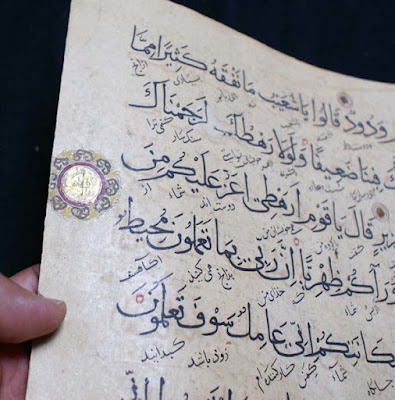“Allah—there is no god ˹worthy of worship˺ except Him. He has the Most Beautiful Names.”
– English translation of The Quran, Surah 20:8
Islam is the youngest of the world’s major religions. The others all began in antiquity, while Islam did not begin until the Early Middle Ages. But despite the head start of these other major religions, Islam has grown to be the second-largest religion in the world today. It is surpassed only by Christianity, and surpasses even those who consider themselves “non-religious” (such as atheists, agnostics, and self-described “secularists”). Thus, there is good reason to learn about what Muslims believe, from sources such as this audiobook. I do not know if the author himself was a Muslim, and note that he did not have a Muslim-culture name. (His name was Charles Adams.) Nonetheless, it is one of the best introductions to their faith that I have ever heard, and the author may well be a Muslim of a more Western background.
Islam was born in the Middle East – and, more specifically, in Arabia. Thus, people are often tempted to equate the word “Muslim” with “Arab.” But in fact, the largest numbers of Muslims are found in South Asia and Southeast Asia. In South Asia, they are found in areas that were once part of British India – such as Pakistan, Bangladesh, and even India itself – although they are not the majority in India, as they are in these other places. The largest Muslim nation by population is Indonesia, a nation far removed from the Middle East. Minority populations are also found in many other parts of the world, including many parts of Europe.
Muhammad’s first revelation, Surah Al-Alaq, later placed 96th in the Qur'anic regulations
Nonetheless, there’s a reason that people tend to associate Islam with the Arabic world, since this is indeed where the faith was born. The Prophet Muhammad was a speaker of Arabic. Furthermore, the Quran – Islam’s scripture – is also in Arabic. The classical Arabic of the Quran is very different from that found in modern Arabia, and the other Arabic-speaking nations of the Middle East and North Africa. But believers throughout the Muslim world, including countries that do not speak Arabic, endeavor to learn the language of the Quran today. To Muslims, only the Arabic version of the text is truly “the Quran” at all. Most Muslims acknowledge that the ideas can be translated into other languages, sometimes even with some accuracy. Nonetheless, translations into other languages (such as English) often acknowledge that their versions are not “the Quran” as understood by Muslims. Artists speaking other languages of the Muslim world, such as Persian or Turkish, have usually depicted the original Arabic of any Quranic quotations in their artwork, sometimes accompanied by helpful translations into their own languages for their own people.
Arabic Quran with interlinear Persian translation from the Ilkhanid Era
The Quran is obviously the most sacred of all the Muslim books. But there are other traditions that are also important to the Muslim world. For example, there are sayings attributed to Muhammad, which have been passed down orally through the centuries. Muslims do not always agree about how to determine whether alleged quotations from the Prophet are really his word or not, but they usually agree that at least some of these quotations are reliable. This is an issue that this audiobook examines briefly, in a short segment on it. They also talk about the split between Sunni Muslims and Shia Muslims, and its origins in the disputes over who should succeed Muhammad as their leader. They argue that these two branches of Islam have more similarities than differences, and this is probably true. Nonetheless, they spend some time on the differences as well, and show the diversity of opinions in the Muslim world. Two things that they didn’t mention were the role of women in Islamic culture, and the religion’s prominent position on homosexuality. But they do examine other beliefs in great depth, and help you to understand why Muslims believe as they do.
I do not pretend to do justice to this topic in a blog post of this length. But suffice it to say that this examines the beliefs of Islam in much more depth than any other source that I have ever heard. Nonetheless, I also enjoy a BBC film called “The Life of Muhammad” (later shown on PBS), which gives a more visual depiction of the Prophet Muhammad’s life story – although they avoid the forbidden visual depictions of the Prophet himself, since Muslims object so strongly to pictures of the Prophet. “The Life of Muhammad” is even written and presented by observing British Muslims, which is an added bonus. I recommend that film and this audiobook to anyone interested in the topic, and consider them both a great place to start.
Footnote to this blog post:
The narrator for this audiobook is Ben Kingsley. He also narrates a PBS documentary called “Islam: Empire of Faith” (made for PBS Empires). Like this audiobook, “Islam: Empire of Faith” was made before 9/11. Its first episode discusses Islam’s beginnings with the Prophet Muhammad. However, the other two episodes focus on some medieval empires that were built on the Muslim faith. If you’re interested more in political history, this may actually be a better source to turn to, although “The Life of Muhammad” is a better source for the more religious history, as is the audiobook that I have been reviewing in this blog post.
If you liked this post, you might also like:
Part of an audiobook series
Religions, Scriptures, and Spirituality
Islam
Others to be covered later
See also the audiobook series
The World of Philosophy
Avicenna and Medieval Muslim Philosophy
Others to be covered later







No comments:
Post a Comment